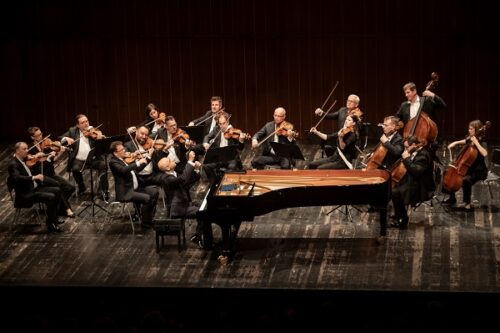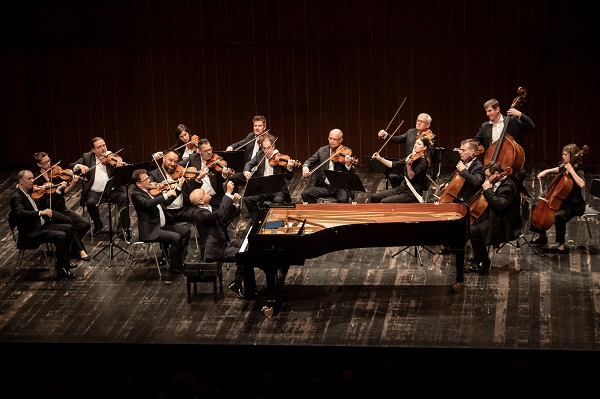
 Portugal Festival de Música dos Capuchos [2] – Closing Concert: Jack Liebeck (violin), Franz Liszt Chamber Orchestra / Filipe Pinto-Ribeiro (piano and conductor). Municipal Theater Joaquim Benite, Almada, 18.6.2023. (LV)
Portugal Festival de Música dos Capuchos [2] – Closing Concert: Jack Liebeck (violin), Franz Liszt Chamber Orchestra / Filipe Pinto-Ribeiro (piano and conductor). Municipal Theater Joaquim Benite, Almada, 18.6.2023. (LV)

Pärt – ‘Orient & Occident’, ‘Summa’
J. S. Bach – Keyboard Concerto No.5 in F minor, BWV1056
Glass – Violin Concerto No.2, ‘The American Four Seasons’
The sold-out Municipal Theater Joaquim Benite in downtown Almada reflected the demographics every presenter dreams of. Due, perhaps, to the presence of Philip Glass’s ‘American Seasons’, the emphasis was on young and hip. The Franz Liszt Chamber Orchestra, making their first appearance at the Festival de Música dos Capuchos, were pretty hip themselves. Their beautiful Hungarian string sound with its characteristically intense vibrato was superbly sculpted by Filipe Pinto-Ribeiro conducting without a baton – as you might expect from a piano virtuoso.
The opening set of Arvo Pärt works showed off the subtler colors and nuances of the nine violins, three each of violas and cello and the double-bass. In ‘Orient & Occident’, their powerful unison glissandi and dynamic shadings brought the music to life, and the audience provided its own bit of drama. Just as Pinto-Ribeiro raised his hands for a pause before the final bar, a smartphone notification tone in the audience went off so perfectly that neither the conductor nor the orchestra missed a beat. Pärt’s setting of the Credo called ‘Summa’ had the kind of devotional patterns swinging softly through the ether that reminded this listener of nineteenth-century immigrant farming communities in the Midwest’s upper Great Plains.
Pärt’s two simple pieces were also the perfect introduction to J. S. Bach’s F minor Piano Concerto, in which the jewel was the Largo in F major. Played by a pianist steeped in the great Russian pianistic tradition, it was two minutes of sheer beauty. Pinto-Ribeiro applied ornaments sparingly but with telling lush elegance, and his magical rhapsodic line against the pizzicatos of the strings wound down to an almost imperceptible pianissimo. In the opening Allegro moderato, he had sung out with as much legato as the music could bear, while the energy that was unleashed in the concluding Presto drew enthusiastic applause from the crowd.

Trying to understand Philip Glass’s take on Vivaldi’s Four Seasons in his ‘American Four Seasons’ reminded me of Donald Tovey’s experience with program music: no listener ever matches the music with the program in the same way as another. This is acknowledged by Glass himself in his piece for which the titles of the movements offer no clues as to where their correspondence with Vivaldi’s Four Seasons might lie. It was every listener for themselves, and the excitement in the hall was tangible.
From the moment Jack Liebeck caught the sad opening sounds and rhythms of shtetl dance tunes, his careful precision and warmth were the perfect match for the orchestra’s sumptuous beauty. He handled the brilliant octaves passagework out of Brahms with the assurance and arresting sound of a true virtuoso, and then settled back into a more Vivaldian parity until his chirping figurations awakened the orchestra. He threw off his three big cadenzas and Bachian solos with the chops and passion that he showcased in his recent Orchid Classics recording of Ysaÿe’s six solo sonatas.
Meanwhile Pinto-Ribeiro at the podium carefully kept the accompaniment well-modulated and naturally flowing, anchored at key moments throughout the piece by the superb double bassist, whether rich, deep and even growling with the cellos or, even more telling, with a highly imaginative synthesizer virtuoso whose rattling harpsichord simulation was just the change in texture the music needed. When the bassist flashed a broad smile during his crucial solo riff, it was to everyone’s evident delight. As the end approached, Liebeck soared into a final series of pyrotechnics before he and the orchestra rushed to the music’s madcap conclusion, and the audience roared its approval.
Laurence Vittes
